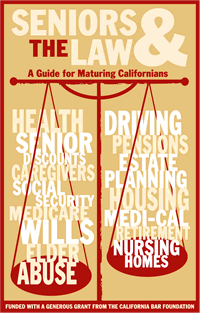

Seniors and The Law is updated and translatedBy Kristina Horton Flaherty
A growing number of older Americans have migrated back to the workplace or stayed on the job in recent years in the face of rising health care costs, a troubled economy and shrinking retirement accounts. But will they lose their Social Security benefits if they keep working? Could they legally be fired from their jobs because of their age? Are they allowed, at a certain age, to deposit extra cash into their retirement accounts? This is just one of the many topic areas addressed in the State Bar’s recently revised Seniors & the Law: A Guide for Maturing Californians. The free guide, inserted into this month’s California Bar Journal, speaks directly to seniors and their grown children on a wide range of law-related topics that affect California’s seniors in their daily lives — from housing options to health care issues to elder abuse to estate planning and government assistance. “The information in this guide can help seniors stay in charge of their lives for as long as possible,” said attorney Helen Karr, a former member of California’s Commission on Aging and a senior herself. “And in the current economic crisis, it’s even more crucial that seniors know their legal rights, and the resources and options available to them.” With more than 4 million residents age 65 or older, California is the most senior-populated state in the nation — and the ranks are growing. But so, too, are the many laws related to seniors and the many programs geared for them. Where can seniors go, by law, for a free hot meal? Can seniors legally install grab bars and lowered countertops in their homes over their landlord’s objections? Can they get a tax break if they downsize to a smaller home? And can they leave instructions in an advance health care directive for the future handling of their medical care in the event they lose the ability to voice such decisions later? The answers to these questions and more can be found in Seniors & the Law. The updated guide also touches on recent changes in the law related to foreclosure and foreclosure consultants, for example, and to insurance brokers and investment advisors who tout themselves as specialists on senior-related issues. In addition, says Karr, who researched and helped develop the publication, “seniors need to be aware of the many ways in which con artists and abusers may try to harm them, particularly during these difficult times.” Seniors & the Law, which was partially funded with a $65,000 grant from the California Bar Foundation, is the third guide in a three-part series published by the State Bar. Each spring, on a rotating schedule, the State Bar publishes one of its guides in celebration of Law Day (May 1). The other two guides are When You Become 18: A Survival Guide for Teenagers, which was last published in 2008, and Kids and the Law: An A-to-Z Guide for Parents, which will be updated in 2010. Since the creation of Seniors & the Law six years ago, some 2.5 million copies have been distributed free of charge in various languages. (The 2009 version is available in English and Spanish.) In addition, more than 40 senior forums and events have been held statewide to give seniors an opportunity to further explore the many topics covered in the popular guide and to question experts in various fields. This year, the updated guide was launched on April 18 in Chula Vista at a “Consumer Protection Day in the South Bay” sponsored by the State Bar, the San Diego District Attorney’s Office, San Diego County’s Aging & Independence Services, the Contractors State License Board and AARP. Additional topic areas addressed in Seniors & the Law include:
Orders for Seniors &the Law should be sent to seniors@calbar.ca.gov. The new publication is available in English and Spanish and all copies are free. Please specify the number of guides (there are no restrictions on amounts) and language versions desired and include a complete mailing address. (P.O. boxes are not acceptable.) While shipping charges also are free, contributions are always acceptable, especially for larger orders. If you do not have access to the internet, please call toll-free 1-888-875-LAWS for a regular U.S. Postal Service Mailing address to send your request. |
||||||||
|
||||||||
